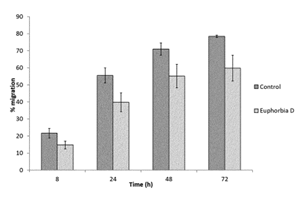Colorectal cancer is the fourth most common cancer worldwide and the second most common type of cancer among residents in Europe. In 2022, over 1.1 million new cases were detected, making it the leading cause of mortality from oncological diseases. Its high incidence and significant impact on patients’ quality of life highlight the importance of early detection programs. Strategies such as fecal occult blood tests or colonoscopy allow for the diagnosis of cancer at early stages, when therapeutic options are more effective, and survival rates are significantly higher. Traditionally, colorectal cancer has been treated through surgery, chemotherapy, and, in some cases, radiotherapy. However, the development of targeted therapies has revolutionized the treatment of this disease. In this scenario, nanomedicine emerges as a key tool for improving current treatments. In addition to enhancing existing therapies, it also enables the development of new personalized drugs tailored to the molecular characteristics of each patient. In this context, researchers from ibs.Granada, in collaboration with the company Cellbitec, have developed a nanoconjugate for the treatment of colorectal cancer.

Researchers have developed a drug delivery system based on calcium phosphate nanoparticles functionalized with bioactive compounds from plant extracts. It is an inorganic nanoparticle conjugated with two compounds from seeds, whose effectiveness has been tested in both in vitro and in vivo assays. This system aims to enhance the targeted delivery and effectiveness of therapeutic agents, particularly in cancer treatment.
Its effectiveness has been tested both in vitro and in vivo assays using mouse models, validating its antitumor and antiangiogenic activity in subcutaneous and intracolonic tumor models. To advance the potential clinical translation of this development, preclinical tests have been conducted related to toxicity, maximum dosage, and chronic toxicity, among others. Additionally, the extraction of bioactive compounds and the use of nanocomplexes in colorectal cancer, as well as in other types of cancer, have been protected by an international patent in the United States, Europe, China, and Vietnam.
The main benefits this technology offer are:
- Enhanced bioavailability of therapeutic agents.
- Minimized side effects through targeted delivery.
- Precise drug delivery directly to tumor sites.
- Optimized treatment efficacy, particularly in cancer therapy.
The represented institution is looking for a collaboration that leads to commercial exploitation of the presented invention.
Institution: Instituto de Investigación Biosanitaria de Granada (ibs.Granada) & Fundación Cellbitec
TRL: 4
Protection status: Patent granted in the United States, Europe, China, and Vietnam.
Contacto: Noelia Mas / noelia@viromii.com

